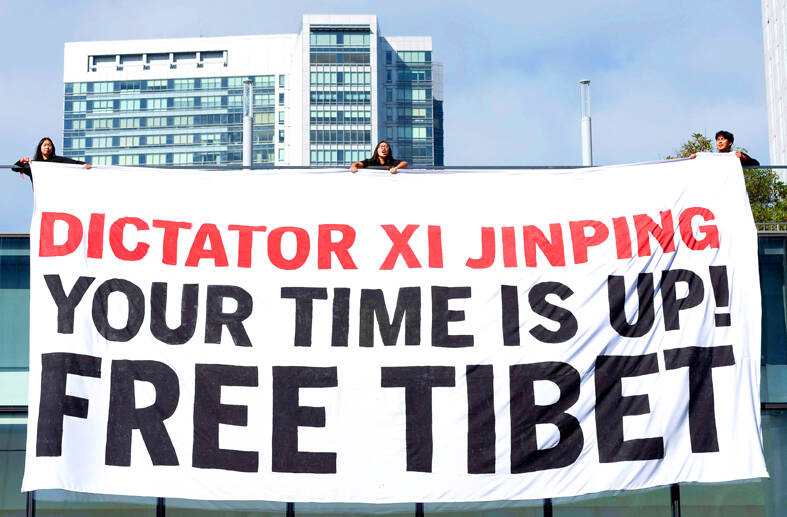US President Joe Biden and Chinese President Xi Jinping (習近平) are to meet on Wednesday in California for talks on trade, Taiwan and fraught US-Chinese relations in the first engagement in a year between the leaders of the world’s two biggest economies.
The White House has said for weeks that it anticipated Biden and Xi would meet on the sidelines of the APEC summit in San Francisco, but negotiations went down to the eve of the gathering, which started yesterday.
The leaders would discuss the “continued importance of maintaining open lines of communication” and how they “can continue to responsibly manage competition and work together where our interests align, particularly on transnational challenges that affect the international community,” White House press secretary Karine Jean-Pierre said in a statement.

Photo: AFP
Two senior Biden administration officials — who earlier briefed reporters on condition of anonymity under ground rules set by the White House — said the leaders would meet in the San Francisco Bay area, but declined to offer further details because of security concerns.
Meanwhile, US Secretary of the Treasury Janet Yellen on Friday insisted that Washington and Beijing had to re-establish “healthy economic relations.”
However, the US would not shy away from taking unilateral action against Chinese firms supplying defense equipment to Russia for its invasion of Ukraine if Beijing failed to take preventative action, she said.
“We do not seek to decouple our economy from China’s,” Yellen told reporters after a two-day meeting with Chinese Vice Premier He Lifeng (何立峰) in San Francisco. “This would be damaging to both the US and China and destabilizing to the world.”
“During our discussions, we agreed that in-depth and frank discussions matter, particularly when we disagree,” Yellen said.
She said she had accepted an invitation to visit Beijing next year.
“There is no substitute for in-person diplomacy,” said Yellen, who added that she believed the two laid the groundwork for a productive meeting between Biden and Xi.
The meeting between the leaders is not expected to lead to many, if any, major announcements.
Instead, Biden is looking toward “managing the competition, preventing the downside risk of conflict and ensuring channels of communication are open,” one official said.
The agenda includes no shortage of difficult issues.
Differences in the already complicated US-Chinese relationship have only sharpened in the past year, with Beijing bristling over new US export controls on advanced technology, Biden ordering the shooting down of a Chinese spy balloon and Chinese anger over a stopover in the US by President Tsai Ing-wen (蔡英文) earlier this year, among other issues.
Regarding Taiwan, Biden intends to reaffirm the US wants no change in the “status quo,” one official said.
The officials also said that Biden is determined to restore military-to-military communications that Beijing largely withdrew from after then-US House of Representatives Speaker Nancy Pelosi visited Taiwan in August last year.
Additional reporting by AFP and Reuters

The CIA has a message for Chinese government officials worried about their place in Chinese President Xi Jinping’s (習近平) government: Come work with us. The agency released two Mandarin-language videos on social media on Thursday inviting disgruntled officials to contact the CIA. The recruitment videos posted on YouTube and X racked up more than 5 million views combined in their first day. The outreach comes as CIA Director John Ratcliffe has vowed to boost the agency’s use of intelligence from human sources and its focus on China, which has recently targeted US officials with its own espionage operations. The videos are “aimed at

STEADFAST FRIEND: The bills encourage increased Taiwan-US engagement and address China’s distortion of UN Resolution 2758 to isolate Taiwan internationally The Presidential Office yesterday thanked the US House of Representatives for unanimously passing two Taiwan-related bills highlighting its solid support for Taiwan’s democracy and global participation, and for deepening bilateral relations. One of the bills, the Taiwan Assurance Implementation Act, requires the US Department of State to periodically review its guidelines for engagement with Taiwan, and report to the US Congress on the guidelines and plans to lift self-imposed limitations on US-Taiwan engagement. The other bill is the Taiwan International Solidarity Act, which clarifies that UN Resolution 2758 does not address the issue of the representation of Taiwan or its people in

US Indo-Pacific Commander Admiral Samuel Paparo on Friday expressed concern over the rate at which China is diversifying its military exercises, the Financial Times (FT) reported on Saturday. “The rates of change on the depth and breadth of their exercises is the one non-linear effect that I’ve seen in the last year that wakes me up at night or keeps me up at night,” Paparo was quoted by FT as saying while attending the annual Sedona Forum at the McCain Institute in Arizona. Paparo also expressed concern over the speed with which China was expanding its military. While the US

SHIFT: Taiwan’s better-than-expected first-quarter GDP and signs of weakness in the US have driven global capital back to emerging markets, the central bank head said The central bank yesterday blamed market speculation for the steep rise in the local currency, and urged exporters and financial institutions to stay calm and stop panic sell-offs to avoid hurting their own profitability. The nation’s top monetary policymaker said that it would step in, if necessary, to maintain order and stability in the foreign exchange market. The remarks came as the NT dollar yesterday closed up NT$0.919 to NT$30.145 against the US dollar in Taipei trading, after rising as high as NT$29.59 in intraday trading. The local currency has surged 5.85 percent against the greenback over the past two sessions, central